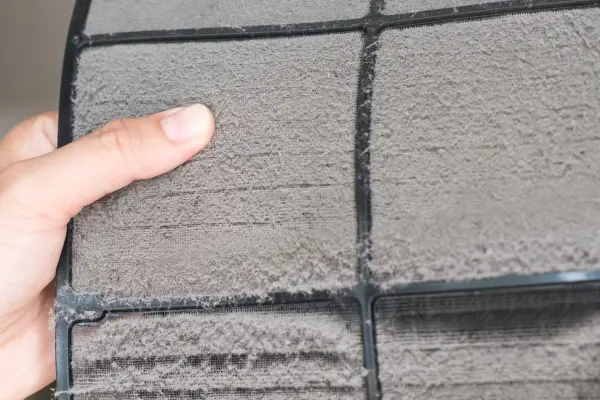
Stale indoor air is a common problem in many homes. Most of the time, stale air is a result of a lack of fresh air circulating through the house. But sometimes stale air also has an unpleasant smell. This smell can have many causes, from built-up pollutants to pet odours, smoke, and more. Unpleasant smells are bad enough, but at higher levels stale air in the house can become a serious health hazard for you, your children, and even your pets. To keep yourself and your loved ones safe, keep reading to learn about why your house smells like stale air and what you can do to make the air in your home healthier.
Causes of Stale Air
The root cause of stale air is a lack of proper ventilation. But air conditioners and furnaces blow air around, right? So, it may leave you asking, “why does my air conditioner smell bad?” There are many reasons why this may be the case. As moisture and contaminants increase indoors, your home may start to develop an unpleasant odour and create an unhealthy environment. The most common causes of stale air include:
- Older Homes – The charm and character of older homes are sometimes accompanied by what we think of as “old house” smell: a kind of musty odour that no amount of cleaning or air freshener seems to get rid of. The main cause of old house smell is usually a combination of odours that have gotten into the paint, fabrics, and ductwork. Dirty ductwork, in particular, can quickly become both a nuisance and a health hazard.
- Mould – Another common cause of unhealthy indoor air is mould in your HVAC system. Mould spores can grow anywhere there is humidity, which includes inside your home and your ductwork. Mould often creates a musty, unpleasant smell, often one of the first signs that you have a mould problem in the house. If your air conditioner smells bad when turned on, mould could be the reason why.
- Mildew – Mildew, on the other hand, is a problem that most often affects air conditioning systems. Dirty filters and water drainage issues can both lead to the growth of mildew in an air conditioning unit. When that happens, air vents all over the house will start to blow smelly, contaminated air. In fact, mildew is one of the top reasons why your air conditioner smells musty.
- Smoke Smells – Another source of unpleasant smells in the house could be due to smoke damage. Smoke from cooking fires, fireplaces, cigarettes, and other common sources can all be absorbed into paint and fabrics. But more importantly, smoke often leaves behind chemicals in the air that, if not properly ventilated, could cause serious health problems.
- Pet Dander – Our pets bring us lots of joy, but they can also become a source of unpleasant smells and stale air. Pet dander, in particular, can easily build up in a home that lacks proper ventilation, leading to allergic reactions and unwanted odours. The longer pet dander is allowed to accumulate, the more difficult it can be to completely eliminate it from the air inside your home.
- Allergens – Along with pet dander, other common allergens can also invade indoor air and become both a nuisance and a hazard. Dust, pollen, fungal spores, and even insects can all cause indoor air to become stale and unhealthy. Without proper filtration, even people or pets without sensitive respiratory systems could develop health problems due to the allergen levels in your home.
Related Topic: Tips to Improve Indoor Air Quality
Effects of Stale Air
No matter what is causing stale air in your home, the results are always the same: unpleasant smells and unhealthy air.
- Bad Smells – When the air in your home smells bad, it can have a significant impact on you, your family, and your pets. For example, bad smells can make you feel uncomfortable in your own home, greatly diminishing any enjoyable activity you and your family do together. Bad smells also have a tendency to follow you out the door, giving your clothes and even your hair an unpleasant odour. Guests may avoid coming over if your house smells bad, and even your pets may prefer to spend their time outdoors to avoid breathing your indoor air.
- Health Problems – Stale air can also lead directly to serious health problems. If your indoor air is filled with allergens, chemicals, mould spores, and more, it can cause health issues from skin irritation to headaches and fatigue. People or pets with sensitive respiratory systems or existing allergies may be particularly affected by stale air, making existing conditions worse or causing new symptoms. In fact, poor indoor air quality could be causing you, your family, and your pets more health problems than you realize.
How to Combat Stale Air
If you notice stale air in your home, there are a few things that you can do to get rid of it:
- Conduct an Air Quality Assessment – Your first step to eliminating stale air is to assess the current air quality in your home. An air quality assessment is something that you can hire a professional to do for you or even do yourself. A comprehensive air quality assessment should check for visible signs of mould and mildew, as well as test the air for the presence of carbon monoxide, radon, and common pollutants. There are monitors you can buy to help you detect the presence of these elements in the air in your home, but for best results, you may want to have a professional assessment done.
- Install an Attic Fan – Another way to address stale air in your home is to install an attic fan. An attic fan will help push hot air and moisture out of your attic, helping to prevent the growth of mould and to make your cooling system more efficient.
- Use an Air Purifier – To help alleviate problems associated with dust, pet dander, pollen, and other allergens, you might consider installing an air purifier in your home. Perhaps you’ve been wondering whether air purifiers help with smells. The answer is yes, they do! Air purifiers work to filter your indoor air and trap particles that can cause respiratory problems and allergies. Certain types of purifiers can even help control smells caused by mould spores and smoke.
- Improve Air Quality – Ultimately, the quality of the air in your home depends on how clean and well-maintained your ductwork and HVAC system is. You can significantly reduce stale air issues by having your vents and ductwork cleaned and changing your filters regularly. Once your system is clean, upgrading to HEPA filters can then help keep common allergens and mould from accumulating in your system again and alleviate the problems that come from stale indoor air.
Get Professional Air Quality Service
It can be a relief to learn that there are solutions to your home’s unhealthy air quality. As you assess your situation and decide what you need to do, it may be helpful to get professional assistance with the task. In fact, it may be the best way to ensure your family’s comfort and health. At Aire Serv Canada, we are committed to helping resolve air quality problems as efficiently and professionally as possible. To learn more about the many quality services we offer, visit us at AireServ.ca today!

